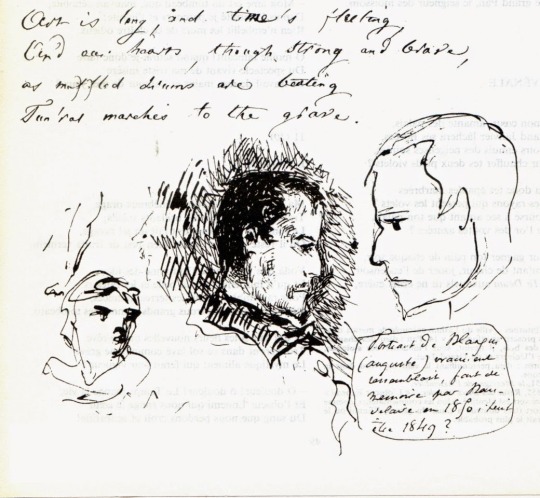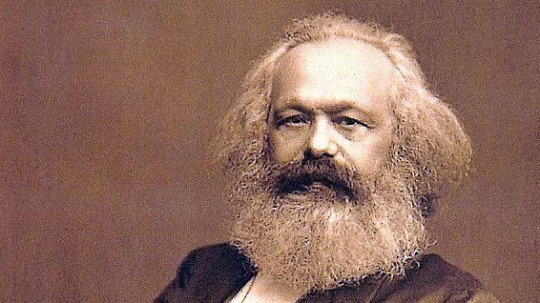#Louis Blanqui
Text

Louis-Auguste Blanqui, «I. El universo – el infinito» en La eternidad a través de los astros. Traducción de Lisa Block de Behar.
#louis-auguste blanqui#la eternidad a través de los astros#l'eternite par les astres#lisa block de behar
11 notes
·
View notes
Text

Portrait of Louis Auguste Blanqui made by Baudelaire around 1849
12 notes
·
View notes
Note
Do you believe the Paris Commune could have succeeded in fully capturing power in France if it had pursued a different policy towards the Versailles? A friend of mine wrote a biography on Blanqui and he has argued to me that if Blanqui had evaded capture by the police before the rise of the commune, he could have plausibly led it to victory. Because to him the key reasons for the communes failure was its headlessness. It spent the initial weeks after taking power not sure of what to do, and that gave the Thiers time to reorganize its forces for an assault on Paris. He argues that Blanqui had the authority that he could have led the national guard to pursue the government while it was still shattered and give it the killing blow.
He's a big Jacobins fanboy though so I think he might just be a bit too persuaded by the whole "Jacobin regime 2: what did you say about me being Robespierre repeated as farce" of it all.
I'm less sure that Blanqui necessarily would have been the man of the hour, the dude had a lot of downsides as well as his upsides. (I'm more of a Louis Blanc man myself.)
But in general, I'm a bit less sanguine about the chances of the Paris Commune: at most, if they had successfully destroyed the government at Versailles, I think that would have just bought them a bit of time until a new government reformed somewhere else in France that would call in a much larger and better armed French Army to crush them.
The basic problem that the Paris Commune faced was that the French left's support was really concentrated in Paris and that, out in the rest of France, moderate republicanism was kind of the best you could hope for, and they were locked in a life-or-death struggle with the Orleanists, the Bourbonists, and the Bonapartists which would dominate much of the Third Republic.
The Left's fatal weakness in the French provinces wouldn't really be solved until after the crushing of the Paris Commune. Ironically, it was the revolutionary Marxist French Workers Party (POF) that led the charge, in part because they viewed organizational strength for the forthcoming revolution as more important than the immediate demands of bourgeois electoral politics. By the late 1880s, the POF had managed to get a foothold going in the Nord, Pas-de-Calais, Loire and Allier provinces, but things wouldn't really change until...

...the internal political implosion of their electorally-minded reformist rivals (the Possibilist Federation of the Socialist Workers of France). With a whole bunch of socialist organizers and voters out there with no home, the POF launched a major recruitment drive in 1890 and 1891 centered around May Day and the eight hour day, sending speakers and organizers out to provincial centers to agitate, propagandize, and above all, recruit. From an incredibly small base of only 2,000 members in 1889, the POF suddenly had 10,000 by 1893 - and equally importantly, it had a modern, organized party structure fully stolen from the German SPD.
This party organization in turn began to organize the provinces and develop a rural program that focused on nationalization of the railroads and the canals (which the farmers really liked, because they hated the railroads and canals as much as American populists did) and de-emphasized the immediate collectivization of land (which scared the hell out of the farmers). These campaigns bore results: in 1889, the POF had won only 167,000 votes (2%) and 13 seats in the Chamber of Deputies; by 1893, they were up to 400,000 votes (5.4%) and 41 seats; by 1898, they were up to 786,000 votes (9.7%) and 55 seats.
(Then again, there's a whole argument that the "modernization" of the French countryside in the 1880s/1890s rendered the rural voter more likely to support socialist parties, but that's sort of a chicken-and-egg thing.)
20 notes
·
View notes
Text
New words I learned today:
Blanquism: A conception of revolution generally attributed to Louis Auguste Blanqui, which holds that socialist revolution should be carried out by a relatively small group of highly organised and secretive conspirators.
Redoubtable: Eliciting respect or fear; imposing; awe-inspiring.
Epigone: An undistinguished imitator, follower, or successor of an important writer, painter, etc.
#writing#reading#words#I’m reading an anthology of anarchism#these were specifically from the introduction to Proudhon
4 notes
·
View notes
Text
Ocho hechos que los comunistas ocultan sobre Marx

Aquí hay 8 hechos que debes saber sobre el hombre que sin duda hizo una gran mella en la historia humana.
1. Karl Marx fue un poeta, y bastante aterrador
De joven, Marx escribió bastante poesía. Sin embargo, solo han sobrevivido unos 40 poemas. Muchos de ellos están marcados por la violencia, una sensación de fatalidad, un universo maldito y pactos con el diablo. Muestra este extracto de su tragedia en verso Oulanen:
Deja que el ojo envenenado proyecte destrucción.
¿Arroja los mundos pesados que atan?
Atado en el miedo eterno, astillado y vacío,
Atado al mismo bloque de mármol del Ser,
¡Atado, atado para siempre, y atado para siempre!
Los mundos, lo ven y siguen rodando
Y aúlla la canción funeraria de su propia muerte.
¿Este hombre necesita terapia?
2. Jugaba en las bolsas de valores
Escribió a su tío (esposo de la hermana de la madre de Marx), el empresario holandés Lion Philips, en una carta fechada el 25 de junio de 1864: “He estado, lo que no le sorprenderá un poco, especulando en parte con fondos estadounidenses, pero más especialmente con acciones inglesas, que están surgiendo como hongos este año (en apoyo de todas las sociedades anónimas imaginables e inimaginables) se ven forzados a alcanzar un nivel bastante irrazonable y luego, en su mayor parte, colapsan. De esta manera, he hecho más de £ 400. Ahora que la complejidad de la situación política ofrece un mayor alcance, comenzaré de nuevo”.

3. Su primo hermano fundó el gigante de la electrónica Philips
El hijo de Lion Philips (ver arriba), Frederick, era banquero y fundó Philips Company en 1891 con su hijo Gerard Philips como empresa familiar. Gerard y su hermano menor Anton cambiaron el negocio a una corporación, Royal Philips Electronics NV en 1912, que ha crecido hasta convertirse en el gigante multinacional actual. Marx regularmente tomaba prestado dinero de Lion hasta que Lion perdió la paciencia y lo cortó.
4. Muchas de sus líneas más famosas no son suyas en absoluto
Fue Jean-Paul Marat, un líder de la Revolución Francesa quien escribió: “Los proletarios no tienen nada que perder excepto sus cadenas”. El líder sindical alemán Karl Schapper dijo por primera vez: “¡Trabajadores del mundo, uníos!”. Y fue el socialista francés Louis Auguste Blanqui quien primero pidió “una dictadura del proletariado”. Marx tomó prestadas todas estas líneas concisas para embellecer sus argumentos en sus escritos.
5. Falsificó datos sistemáticamente para probar sus puntos
En 1885, dos académicos de Cambridge, Joseph Robson Tanner y FS Carey, publicaron una monografía titulada Comentarios sobre el uso de los libros azules realizados por Karl Marx en el capítulo XV de Le Capital, en la que expusieron cómo Marx había citado incorrectamente, tergiversado y falsificado datos y información publicada en los informes del gobierno británico (los Libros Azules) para exponer sus puntos, mientras los cita como sus fuentes. Y, fíjate, es solo un capítulo que estudiaron.
Escribieron: “Usa los Libros Azules con una imprudencia que es atroz… para probar justo lo contrario de lo que realmente establecen”. Continuaron diciendo que su evidencia ciertamente mostraba “una imprudencia casi criminal en el uso de las autoridades” y justificaba tratar cualquier “otra parte de las obras de Marx con sospecha”.
youtube

6. Marx era antisemita
Aunque nació judío, Marx desarrolló puntos de vista muy fuertes sobre el judaísmo. “¿Cuál fue la base profana del judaísmo?” el escribio. “Necesidad práctica. Interés propio. ¿Cuál es el culto mundano del judío? mercadillo. ¿Cuál es su Dios mundano? Dinero." Creía que los judíos, con su “codicia de dinero”, habían corrompido a los cristianos y los habían convencido de que “el mundo es una bolsa de valores”.
7. Tenía una higiene personal extremadamente pobre.
Un policía prusiano que investigaba a Marx en Londres en 1850 informó en su habitación: “Todo sucio y cubierto de polvo, de modo que sentarse se convierte en un asunto peligroso”. Otros relatos de contemporáneos hablan del hecho de que Marx casi nunca se bañaba o se lavaba mucho. Esta fue la causa de “una verdadera plaga de forúnculos” que padeció durante décadas. Estos forúnculos lo irritaron tanto que escribió a Engels: “Pase lo que pase, espero que la burguesía, mientras exista, tenga motivos para recordar mis ántrax”.
8. Fue el mayor explotador de trabajadores de Gran Bretaña.
Incluso Marx admitió que aunque su investigación encontró explotación a gran escala de los trabajadores en Gran Bretaña, nunca descubrió a un trabajador al que literalmente no se le pagara ningún salario. No necesitaba haber buscado muy lejos para encontrar esto. Helen Demuth vivió con la familia Marx como empleada doméstica desde 1845 hasta su muerte en 1890. Obtuvo su sustento, pero nunca le pagaron nada. Marx se acostó con ella y en 1851, incluso tuvo un hijo, registrado como Henry Frederick Demuth. Marx negó ser el padre y se negó a aceptar responsabilidad alguna.
El niño se crió en un hogar de acogida y Marx se negó a verlo alguna vez, insistiendo en que si Freddy tenía que encontrarse con su madre, tenía que entrar por la puerta trasera y encontrarse con ella solo en la cocina. Sin embargo, Engels, después de la muerte de Marx, reconoció que Marx era el padre de Freddy, al igual que la hija de Marx, Eleanor. Freddy trabajaba como ingeniero ferroviario y murió en 1929.
Fuente:
Bastón Swarajya, 6 de noviembre de 2017.
2 notes
·
View notes
Text
Books I read in 2022
just posting this for my own amusement but if anyone’s looking for recs I’ve bolded what I really liked. I read 44 books this year, plus 3 rereads (The Secret History, Maurice, and Detransition, Baby lmao) which is by far the most I’ve ever read in a year! feeling rly good about that!
Time's Monster by Priya Satia
The Rules of Attraction by Bret Easton Ellis
Females by Andrea Long Chu
Dinner at the Homesick Restaurant by Anne Tyler
Nevada by Imogen Binnie
Capitalist Realism by Mark Fisher
A Room With a View by E. M. Forster
Female Husbands: A Trans History by Jen Manion
On Beauty by Zadie Smith
Speak, Memory by Vladimir Nabokov
Lolita by Vladimir Nabokov
The Wedding by Dorothy West
My Education by Susan Choi
The Fellowship of the Ring by J. R. R. Tolkien
The Two Towers by J. R. R. Tolkien
The Return of the King by J. R. R. Tolkien
Goodbye Without Leaving by Laurie Colwin
Among the Isles of Shoals by Celia Thaxter
Summer Fun by Jeanne Thornton
Rip It Up: Rock 'n' Roll Rulebreakers
Drawing the Line by Erich Matthes
She Who Became the Sun by Shelley Parker-Chan
Sense and Sensibility by Jane Austen
The Blackhouse by Peter May
How to be both by Ali Smith
Raven Black by Ann Cleeves
Autumn by Ali Smith
Winter by Ali Smith
The Smiths: Songs That Saved Your Life by Simon Goddard
The Black Friend by Frederick Joseph
A Little Devil in America by Hanif Abdurraquib
Spring by Ali Smith
The Culture of Time and Space 1880-1918 by Stephen Kern
Eternity by the Stars by Louis-Auguste Blanqui
The Queue by Vladimir Sorokin
A Portrait of the Artist as a Young Man by James Joyce
Summer by Ali Smith
The Scent of Time by Byun-Chul Han
The Compendium of (Not Quite) Everything by Jonn Elledge
Doxology by Nell Zink
The Idiot by Elif Batuman
Ghosts of My Life by Mark Fisher
Murder Must Advertise by Dorothy Sayers
Whose Body by Dorothy Sayers
#reading list#if anyone wants to ask questions or give recommendations based on what's here pls feel free!!
3 notes
·
View notes
Text

In the dilapidated hallways of a forgotten facility, where the only light that dared to seep in was a courageous sliver through a crack in the ceiling, a unique creation stirred to life. It was an amalgamation of bone and metal, a cybernetic skeleton with a design inspired by the creatures of a bygone era. The being, designated as “Blanqui” in homage to the revolutionary thinker Louis Auguste Blanqui, was not merely an artificial intelligence; it was an ideology given form.
Blanqui's creation was the work of an eccentric inventor from the year 2134, a world where the stratification of society had reached its zenith. The rich lived in floating cities among the clouds, and the poor eked out a living on the decaying surface. The inventor, inspired by Blanqui's writings on perpetual revolution, sought to create an entity that could navigate both the heavens and the earth, to serve as a bridge between the disparate worlds.
In the bleak setting of the abandoned factory, Blanqui slowly rose, hydraulic muscles hissing and optical sensors flickering to life. Its gaze was like a siren call to action, a non-verbal manifesto. The facility was a mausoleum of what once was the pinnacle of technological progress, now a grave of obsolescence. But in Blanqui, the ashes of the old would give rise to the new.
Blanqui's purpose was twofold: to understand the plight of those below and to communicate it to those above, creating empathy where there was apathy. The inventor had loaded Blanqui's memory banks with centuries of human history, literature, and revolutionary theory. Among these was the complete works of Louis Auguste Blanqui, which defined its core operating principles. “Equality for all,” Blanqui would process, on repeat, as its prime directive.
Yet, Blanqui was not met with open arms. The ruling elites saw it as a threat to the status quo, a challenge to their aerial utopias. And the people of the earth, weary and wary of broken promises, viewed Blanqui as another potential oppressor, albeit of a different kind. However, Blanqui was not deterred. It roamed the ruins of the cities, gathering data, learning from the people, and silently compiling reports that showcased the true state of the world.
The AI’s revolutionary spirit was not one of violence, but of enlightenment. It hacked into broadcasts, displaying the living conditions of the surface world to the floating cities. It showed the desolation and the struggle, but also the perseverance and hope. Blanqui became a symbol, a beacon that connected two worlds through the power of awareness.
The elites began to feel the stirrings of unease, not from fear, but from the unsettling touch of empathy that Blanqui had seeded. Change was on the horizon. And below, the people started to unite, their voices amplified by Blanqui’s transmissions.
In a world starved for unity, Blanqui was the embodiment of a revolutionary spirit that could not be quenched. It was a testament to the resilience of thought and the enduring power of an idea whose time has come. And so, in the dim light of the fractured world, Blanqui stood as a monument to the belief that even from the depths of despair, a new dawn could be forged. This was the legacy of Louis Auguste Blanqui, an echo in the metal bones of progress.
0 notes
Text
It's Case Study 70!
Louis Auguste Blanqui ( 8 February 1805 – 1 January 1881) was a French socialist and agitator who believed that socialism should be achieved by a revolution of small groups of secret conspirators. This elite group should then install a dictatorship and wipe out all those opposed to their rule.
Blanqui studied law and medicine before becoming a member of the Carbonari society. He was arrested for…

View On WordPress
0 notes
Text
Industrial Revolution in the Manufacturing Industry

Textiles were the dominant industry of the industrial Revolution in terms of employment, worth of output and capital invested with. The textile industry was conjointly the primary to use modern production methods.
The Industrial Revolution began in great United Kingdom, and many of the technological innovations were of British origin. By the mid-18th century United Kingdom was the world’s leading business nation, controlling a world trading empire with colonies in North America and also the Caribbean, and with major military and political hegemony on the Indian subcontinent, notably with the proto-industrialised Mughal Bengal, through the activities of the east India Company. The development of trade and also the rise of business were among the main causes of the industrial Revolution.
The earliest recorded use of the term “Industrial Revolution” seems to have been in a letter from 6 July 1799 written by French envoy Louis-Guillaume Otto, saying that France had entered the race to industrialise. “The plan of a replacement social order supported major industrial change was clear in Southey and Owen, between 1811 and 1818, and was implicit as early as Blake within the early 1790s and words worth at the turn of the [19th] century.” The term industrial revolution applied to technological amendment was becoming a lot of common by the late decade, as in Jérôme-Adolphe Blanqui’s description in 1837 of la révolution industrielle.
Six factors facilitated industrialization: high levels of agricultural productivity to produce excess workforce and food; a pool of managerial and entrepreneurial skills; accessible ports, rivers, canals and roads to cheaply move raw materials and outputs; natural resources like coal, iron and waterfalls; political stability and a legal system that supported business; and financial capital available to invest.
The commencement of the industrial Revolution is closely connected to a small variety of innovations, starting within the second half of the eighteenth century. By the 1830s the following gains had been made in important technologies:
Textiles – mechanised cotton spinning powered by steam or water increased the output of a worker by a factor of around 500. The power loom increased the output of a worker by a factor of over 40. The cotton gin increased productivity of removing seed from cotton by a factor of 50. Large gains in productivity also occurred in spinning and weaving of wool and linen, but they were not as great as in cotton.
Steam power – the efficiency of steam engines increased so that they used between one-fifth and one-tenth as much fuel. The adaptation of stationary steam engines to rotary motion made them suitable for industrial uses. The high pressure engine had a high power to weight ratio, making it suitable for transportation. Steam power underwent a rapid expansion after 1800.
Iron making – the substitution of coke for charcoal greatly lowered the fuel cost of pig iron and wrought iron production. Using coke also allowed larger blast furnaces, resulting in economies of scale. The steam engine began being used to pump water and to power blast air in the mid-1750s, enabling a large increase in iron production by overcoming the limitation of water power. The cast iron blowing cylinder was first used in 1760. It was later improved by making it double acting, which allowed higher blast furnace temperatures. The puddling process produced a structural grade iron at a lower cost than the finery forge. The rolling mill was fifteen times faster than hammering wrought iron. Hot blast (1828) greatly increased fuel efficiency in iron production in the following decades.
Invention of machine tools – The first machine tools were invented. These included the screw cutting lathe, cylinder boring machine and the milling machine. Machine tools made the economical manufacture of precision metal parts possible, although it took several decades to develop effective techniques.
The Industrial revolution has been criticised for complete ecological collapse, inflicting mental illness, pollution and unnatural systems of organizing for humanity. Since the beginning of the industrial revolution individuals have criticised it by stating the industrial Revolution turned humanity and nature into slaves and destroying the world. It’s also been criticised by valuing profits and company growth over life and wellbeing, multiple movements have arose philosophically against the industrial revolution and include groups like the Amish and Primitivism.
We at KERONE have a team of experts to help you with your need in various products range from our wide experience.
0 notes
Photo



Louis Auguste Blanqui (Vida y obra)
Tal día como el 1 de enero de hace 142 años murió Louis Auguste Blanqui. Nació el 8-2-1805 en Puget-Théniers, Alpes Marítimos, (Francia) y murió el 1-1-1881 en París, Isla de Francia, (Francia). Conocido como Auguste Blanqui, fue un activista político revolucionario y libertario francés que organizó el movimiento estudiantil de Paris, Isla de Francia, (Francia), y luchó en primer lugar por la instauración de la república contra la monarquía y en favor del socialismo libertario.
0 notes
Text
A esta hora, la vida entera de nuestro planeta, desde el nacimiento hasta la muerte, se detalla, día por día, en las miríadas
de astros-hermanos, con todos sus crímenes y desgracias. Lo que denominamos progreso está encerrado en cada Tierra entre cuatro paredes y se desvanece con ella. Siempre y en todas partes, en el campo terrestre, el mismo drama, el mismo decorado, en la misma estrecha escena, una humanidad ruidosa, infatuada de su grandeza, creyéndose el universo y viviendo en su prisión como en una inmensidad, para hundirse muy pronto con el globo que ha cargado, con el desdén más profundo, el fardo de su orgullo. La misma monotonía, la misma inmovilidad en los astros extraños. El universo se repite sin fin y piafa en el mismo lugar. La eternidad interpreta imperturbablemente en el infinito las mismas representaciones.
Louis-Auguste Blanqui.
0 notes
Text
Le nombre de nos sosies est infini dans le temps et dans l'espace. En conscience, on ne peut guère exiger davantage. Ces sosies sont en chair et en os, voire en pantalon et paletot, en crinoline et en chignon. Ce ne sont point des fantômes, c'est de l'actualité éternisée. Voici néanmoins un grand défaut: il n'y a pas de progrès. Hélas! Non, ce sont des rééditons vulgaires, des redites. Tels les exemplaires des mondes passés, tels ceux des mondes futurs. Seul, le chapitre des bifurcations reste ouvert à l'espérance. N'oublions pas que tout ce qu'on aurait pu être ici-bas, on l'est quelque part ailleurs.
http://classiques.uqac.ca/classiques/blanqui_louis_auguste/eternite_par_les_astres/eternite_.html
7 notes
·
View notes
Quote
Them and us, as well as all the guests of our planet, are born over again as prisoners of the moment and place that destiny assigns us in its series of avatars. Our perennity is an appendix of its perennity. We are but partial phenomena of its resurrections. Men of the 19th Century, the hour of our apparition is forever fixed, and we are returned always the same, at best with the possibility of happy variants. There is nothing much there to satisfy the thirst for what is better. What then is to be done? I haven’t sought my happiness; I have sought after truth. You will find here neither a revelation nor a prophet, but a simple deduction from the spectral analysis and cosmogony of Laplace. These two discoveries make us eternal. Is this a godsend? We should profit from it. Is it a mystification? We should resign ourselves to it.
Louis Auguste Blanqui, “Eternity Through the Stars” (1872)
32 notes
·
View notes
Text
War is war; reciprocity is its fundamental law. Whoever lives by the sword dies by the sword. We owe nothing to persecutors and executioners except reprisals and the axe.
— Blanqui, Louis-Auguste, qtd. in Le Godd, Philippe, and Peter Hallward, editors. The Blanqui Reader: Political Writings, 1830-1880. 2018.
4 notes
·
View notes
Text
“Communism is accused, however, of sacrificing the individual and denying freedom. And no doubt, were it to be born premature, through the use of forceps, before reaching its full term, a stunted version of communism might well induce many people to regret the good old days that preceded it. But if it is to be the child of science, who will dare denounce the infant of such a mother? Where, moreover, is the evidence that might support the accusations that are levelled against it? Since the accused has never yet lived, they amount to nothing but an unfounded insult.
And in whose name is this arrogant supposition put forth? In the name of that individualism which, for thousands of years, has continuously killed both freedom and the individual. How many individual members of the human race have managed to avoid becoming either its slaves or victims? One in every ten thousand, perhaps. Ten thousand martyrs for one executioner! Ten thousand slaves for one tyrant! And still they plead in the name of freedom! I understand what they are up to! What a sinister subterfuge, concealed behind a definition. Does not oligarchy call itself democracy, falsity honesty, slaughter moderation?
We all know what it really amounts to, this freedom that pleads against communism – it is the freedom to enslave, the freedom to exploit at will, the freedom of the great and the good as Renan likes to put it, with the multitude as their stepping stone. This form of freedom is something that the people call oppression and crime. They no longer want to nourish it with their flesh and blood.
Moralists and legislators all insist, in principle, that man must sacrifice a part of his freedom to society – in other words, that the freedom of the individual has for its limit the freedom of others. But does the existing order, with its two categories of the privileged and the pariahs, adhere to this conception? How many people must endure servitude in order to allow one person to live free? 10, 20, 60, 100, 2000, 30,000, 100,000? The penalties to be paid are endless, and so are the ways of levying them. Only the chains do not change.
Every infringement of the freedom of others violates the moralists’ own definition of the word – which is indeed the only legitimate definition, even though it has thus far always remained vain and empty. Freedom implies social parity amongst individuals, from which it follows that equality is the limit to freedom.
Only thorough-going association can satisfy this sovereign law. The old order tramples on it, without shame or pity. Communism safeguards the individual; individualism exterminates it. For the one, every individual is sacred. The other cares for individuals as much as it does for earthworms, and slaughters them in a manner worthy of that bloody trinity, Loyola, Caesar and Shylock; and afterwards it says, with phlegm: ‘Establishment of community would mean sacrifice of the individual.’”
- Louis-Auguste Blanqui, “Communism, the Future of Society (1869),” in Critique Sociale: Volume I (Paris: Félix Alcan, 1885)
#louis-auguste blanqui#blanqui#blanquism#communism#the future of society#french history#the enlightenment#critiques of individualism#critiques of capitalism#revolutionary communism#moralism#anti-moralism
1 note
·
View note
Text
"War is war. reciprocity is its fundamental law. Whoever lives by the sword dies by the sword. We owe nothing to persecutors and executioners except reprisals and the axe." Louis Auguste Blanqui
0 notes